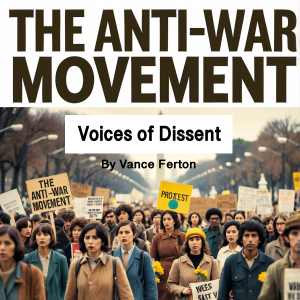

The Anti-War Movement That Changed America
Vance Ferton
This audiobook is narrated by a digital voice.
On a crisp October morning in 1965, David Miller stood on the steps of a federal courthouse in Manhattan, holding a small piece of cardboard that would transform him into a symbol of resistance. The twenty-two-year-old Catholic peace activist raised his draft card above his head, struck a match, and watched as the flames consumed not just a government document but also his own safety and freedom. As photographers captured the moment and federal agents moved forward to arrest him, Miller became the first person prosecuted under a new federal law making draft card burning a felony. His act of defiance marked a pivotal moment in the transformation of scattered opposition to the Vietnam War into a unified movement that would ultimately help bring down a presidency and reshape American society.
The roots of the anti-war movement stretched back to the earliest days of American involvement in Vietnam, when small groups of pacifists, religious leaders, and intellectuals began questioning the wisdom of supporting the South Vietnamese government against Communist insurgency. The movement's intellectual foundations were laid in the coffeehouses near university campuses, in the meeting rooms of Quaker meetinghouses, and in the pages of small-circulation magazines that dared to challenge the Cold War consensus that dominated American political discourse.
The Student Nonviolent Coordinating Committee, fresh from victories in the civil rights movement, provided some of the earliest organized opposition to American involvement in Vietnam. Young activists who had risked their lives registering voters in Mississippi and challenging segregation in Alabama naturally questioned why the United States was supporting an undemocratic government in South Vietnam while claiming to fight for freedom. The connection between domestic civil rights and foreign policy became one of the movement's most powerful themes.
Duration - 58m.
Author - Vance Ferton.
Narrator - Digital Voice Marcus G.
Published Date - Friday, 24 January 2025.
Copyright - © 2025 Vance Ferton ©.
Location:
United States
Description:
This audiobook is narrated by a digital voice. On a crisp October morning in 1965, David Miller stood on the steps of a federal courthouse in Manhattan, holding a small piece of cardboard that would transform him into a symbol of resistance. The twenty-two-year-old Catholic peace activist raised his draft card above his head, struck a match, and watched as the flames consumed not just a government document but also his own safety and freedom. As photographers captured the moment and federal agents moved forward to arrest him, Miller became the first person prosecuted under a new federal law making draft card burning a felony. His act of defiance marked a pivotal moment in the transformation of scattered opposition to the Vietnam War into a unified movement that would ultimately help bring down a presidency and reshape American society. The roots of the anti-war movement stretched back to the earliest days of American involvement in Vietnam, when small groups of pacifists, religious leaders, and intellectuals began questioning the wisdom of supporting the South Vietnamese government against Communist insurgency. The movement's intellectual foundations were laid in the coffeehouses near university campuses, in the meeting rooms of Quaker meetinghouses, and in the pages of small-circulation magazines that dared to challenge the Cold War consensus that dominated American political discourse. The Student Nonviolent Coordinating Committee, fresh from victories in the civil rights movement, provided some of the earliest organized opposition to American involvement in Vietnam. Young activists who had risked their lives registering voters in Mississippi and challenging segregation in Alabama naturally questioned why the United States was supporting an undemocratic government in South Vietnam while claiming to fight for freedom. The connection between domestic civil rights and foreign policy became one of the movement's most powerful themes. Duration - 58m. Author - Vance Ferton. Narrator - Digital Voice Marcus G. Published Date - Friday, 24 January 2025. Copyright - © 2025 Vance Ferton ©.
Language:
English
Chapter 1: Seeds of Resistance
Duration:00:10:27
Chapter 2: From Campus to Streets
Duration:00:11:33
Chapter 3: The Resistance and Radicalization
Duration:00:11:41
Chapter 4: The Movement's Impact on Politics and Culture
Duration:00:11:51
Chapter 5: Legacy and Lessons of Dissent
Duration:00:12:45